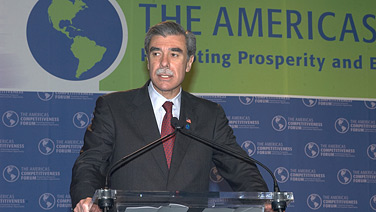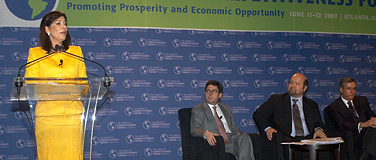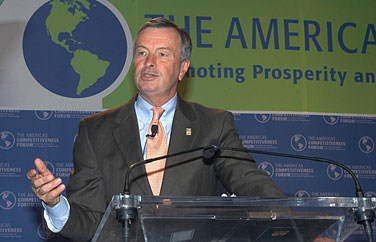|
|
|
|||||||||||||
|
More Than 900 Gather in Atlanta for Americas Competitiveness Forum Government officials, business leaders, and academics from 30 countries in the Western Hemisphere discussed how to accelerate hemispheric prosperity at an event organized by the Department of Commerce. by John Ward More than 900 representatives from businesses and governments throughout the Western Hemisphere gathered in Atlanta, Georgia, June 11–12, 2007, to participate in the Americas Competitiveness Forum. Secretary of Commerce Carlos M. Gutierrez convened this two-day conference on regional competitiveness.
Joining Gutierrez at the event were Secretary of the Treasury Henry M. Paulson, Jr., Secretary of Education Margaret Spellings, and dozens of minister-level government officials representing 30 of the 34 democratically elected countries of the Western Hemisphere. The representatives participated in 22 formal sessions and nearly 200 formal and informal meetings between government officials and business leaders. The forum was an outcome of the November 2005 Summit of the Americas held in Mar del Plata, Argentina. At that meeting, President George W. Bush recommended that the first-ever high-level meeting be convened to focus on improving the region's competitiveness. Need to Compete Emphasized In his opening remarks to forum attendees on June 11, Gutierrez pointed out the economic and political challenges posed to the Western Hemisphere in the face of aggressive economic growth in other regions of the world in recent years. “While many regions are increasing their share of global GDP, our region’s share declined from 34 percent in 1990 to 29 percent last year.… This is what brings us together today.” He pointed out that “we in the Americas need to continue building strategic partnerships and regional economic frameworks to remain globally competitive. And we need to do this to extend the benefits of democracy throughout the hemisphere.” Four Key Themes Examined Forum participants examined the details of the competitiveness challenge in 22 panel discussions that provided real-world examples of successful policies and strategies. The sessions echoed Gutierrez’s points, with their focus on four elements of competitiveness: education and workforce development, innovation, small business and entrepreneurship, and global supply-chain strategies. One of the forum speakers, Peruvian economist Hernando de Soto, addressed competitiveness in light of the information and legal infrastructures that form the basis of economic success. He pointed out that 80 percent of Latin Americans are outside of the “information system” that makes up a formal economy. The legal assumptions, such as limited liability, asset shielding, and perpetual succession, and the recorded transactions that go with them are what allow businesses to function efficiently and to interact with one another. However, according to a study conducted by de Soto for the Inter-American Development Bank, most enterprises in Latin America do not possess such “common knowledge.” “Information,” de Soto noted, “is the biggest challenge we face.”
Another speaker, Ana Vilma de Escobar, vice president of El Salvador, spoke about the progress her country has made in achieving higher rates of economic growth in recent years. “Getting to this point has required long-term commitment,” she remarked, pointing specifically to the twin challenges of promoting higher educational levels and developing public infrastructure, such as energy supply and transmission. Examples and Advice from the Private Sector Speakers from the private sector were prominent participants in the forum. Eduardo Solórzano Morales, chief executive officer of Wal-Mart de México, spoke about how companies can play a vital role in supporting economic growth. He detailed how Wal-Mart de México has provided technical and financial assistance to its suppliers, increased labor productivity, and promoted corporate social responsibility.
Mike Eskew, chairman and chief executive officer of UPS, pointed out impediments to trade in the region. He noted that although Latin America “has the potential to be the next hotbed of trade and economic growth,… our border and customs policies make it sometimes seem like we're enemies.” He offered a number of steps that governments and businesses should take to improve trade, including harmonizing tariff codes, speeding up customs processing, and improving transportation and information technology infrastructures. The choices for the countries of the Western Hemisphere, he emphasized, “are to adapt or become irrelevant." Small Business Lending Program Announced In a speech to attendees on June 12, Paulson addressed another of the forum’s key themes: entrepreneurial development. Observing that only 10 percent of small businesses in Latin America have access to financing from banks and commercial lenders, Paulson announced a U.S.–financed program to expand small business lending in the region. This aid will include technical assistance and training designed to expand small business lending by regional financial institutions, along with loan guarantees to be provided by the Overseas Private Investment Corporation. According to Paulson, approximately $150 million will be available for lending, and 80 percent of the loans will be for less than $100,000. “Spreading economic opportunity within and between the nations of the Americas,” said Paulson, “is urgent and possible.” Growth and Social Justice Ultimately, the economic growth envisioned by the forum’s participants will help to bring about social justice throughout the hemisphere. “Our vision for the Western Hemisphere is one of growth and prosperity,” said Gutierrez in his remarks to the attendees. “Growth empowers people with the tools to take ownership and improve their lives. It promotes trade and investment.… [It] strengthens the delivery of true social justice, which we believe is about giving everyone an equal opportunity to succeed.” A summary report on the forum will be available in late August 2007 on the International Trade Administration's Web site, www.trade.gov. Several follow-up events based on the forum's themes will take place throughout the Western Hemisphere. John Ward is a writer in the International Trade Administration’s Office of Public Affairs.
|
|


